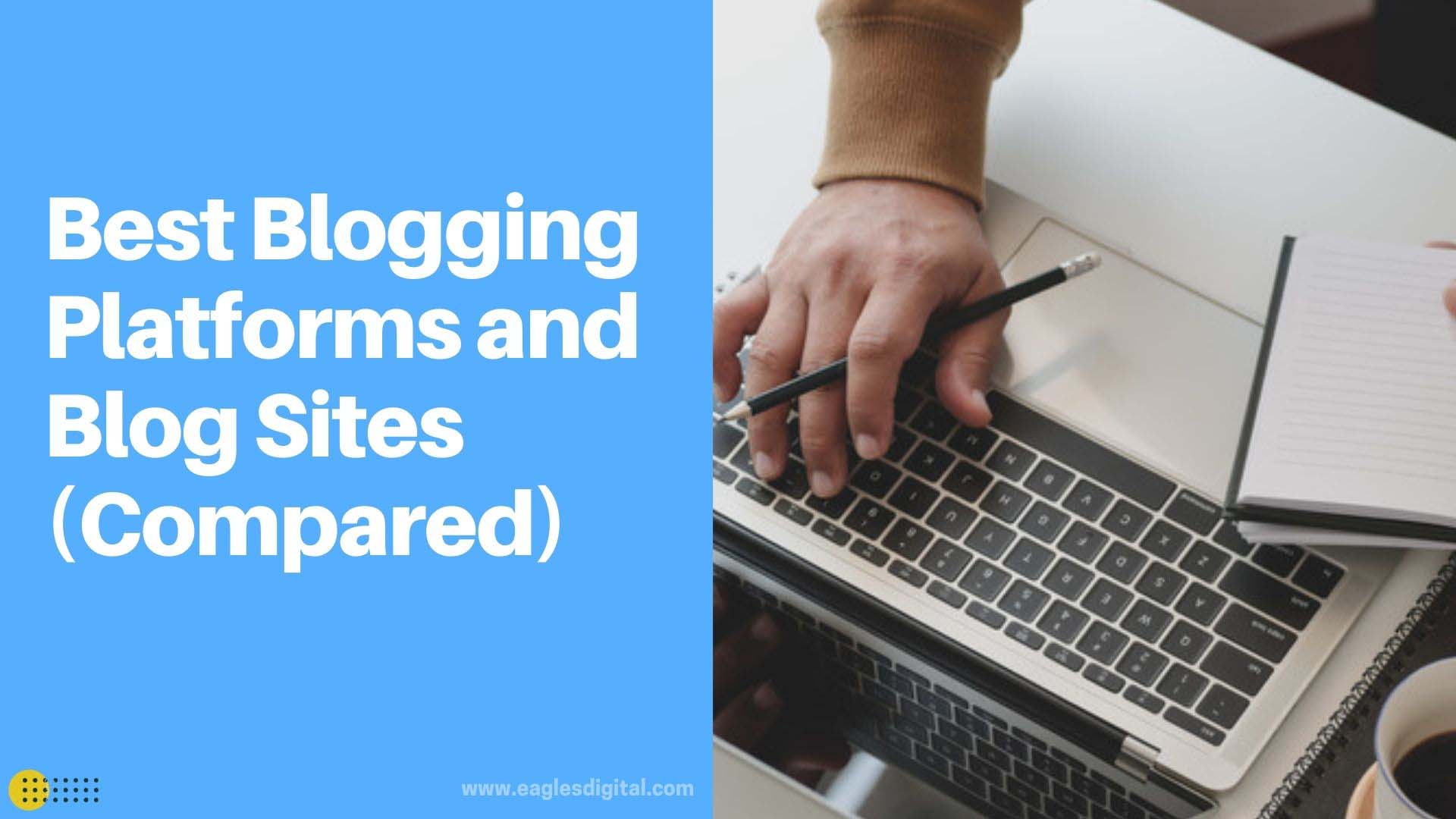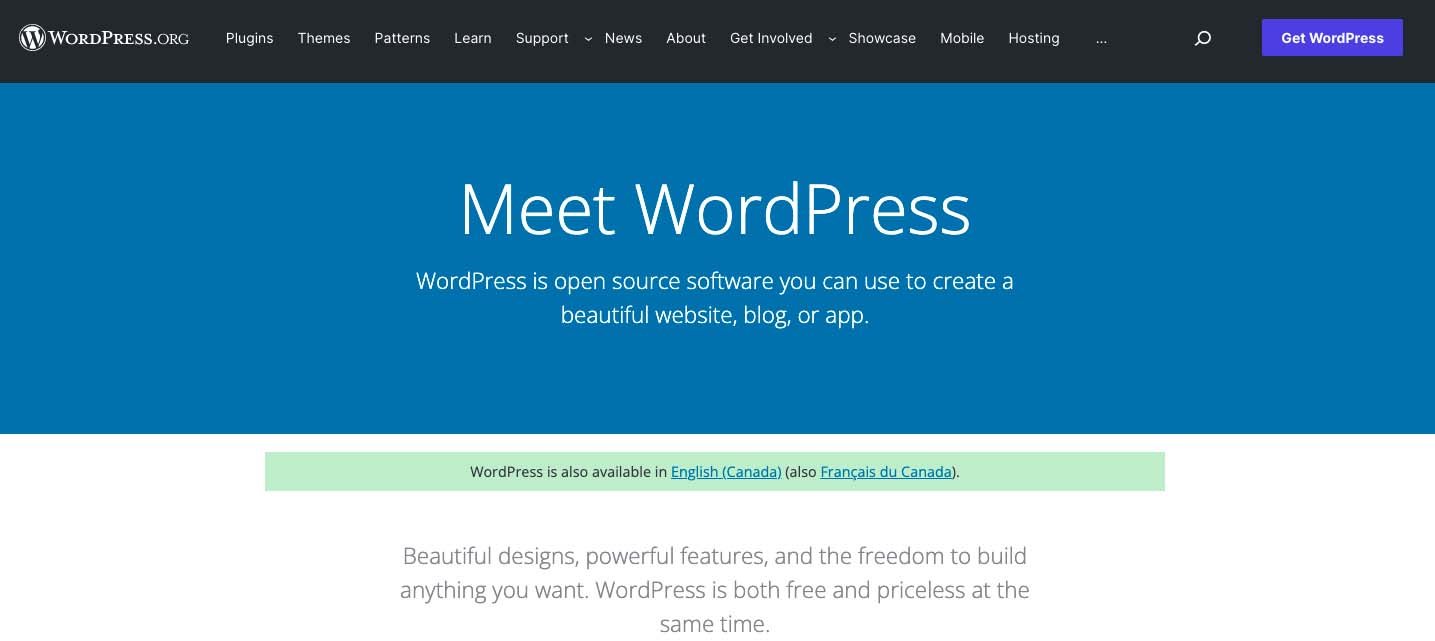The Best Blogging Platforms You Should Consider Using in 2025

To start, grow and maintain a blog effectively, picking the best blogging platform is a crucial step in your journey.
With more than 4.9 billion people worldwide currently connected to the internet, blogging is more important than ever for both personal and business bloggers alike.
Not only does blogging helps you build trust with your target audience, but it also drives traffic to your website and allows you to better convert that traffic into leads.
Below you’ll find my top pick of the 5 best blogging platforms for starting a blog today. To make your decision easier, we’ll walk through the process of choosing the blogging platform that works best for you by going over each platform’s key features, pros, cons, ease of use, price and more.
Let’s get started!
The Top 5 Best Blogging Platforms and Blog Sites for 2023:
-
- WordPress.org— Best Blogging Platform for most
- Wix — Best Blogging Platform for Beginners
- Squarespace – Best Blogging Platform for Creatives
- Medium – Best Platform for Simplicity
- Blogger – Blogging Platform run by Google
What are the best blogging platforms?
Here are my recommendations for the best blogging platforms :
1. WordPress.org – Best Blogging Platform for most

Started in 2003, WordPress is the most popular blogging platform in the world. The platform powers more than 40% of the world’s websites today.
Having created and managed different types of websites using WordPress as a web developer, I’ve learned that there are some good reasons to use WordPress to create your blog. It’s also the website builder I most often choose for personal projects.
With WordPress, you can make your website beautiful with no coding skills required. There are thousands of free themes available to choose from to get started. Most of them come with built-in customization options that give you full design control.
The platform also enables you to add more functionality to your blog by using plugins. These WordPress plugins will help you to add advanced features like site security, analytics, setting up newsletter subscriptions, contact form and more.
One of the things I love about WordPress, it is extremely scalable. As your blog and audience grow, you’ll be able to keep adjusting your site to accommodate that growth in whatever direction you want to go.
Despite being the most flexible and powerful blogging platform, WordPress comes with an intuitive dashboard that makes set-up simple. Users can easily create posts and format their blog posts, save drafts, customize their website design, add navigation menus, and more.
Key Features
- Flexibility: With WordPress, you have full control over every aspect of your website.
- Plugins: WordPress gives you access to more than 59,000 free and paid WordPress plugins that help boost your website’s performance and drive more traffic.
- Design: It has thousands of free WordPress themes to choose from. Most of them are fully responsive. There are enough templates to fit any type of blog or website.
- Built for blogging: WordPress is a user-friendly content management system. It makes it simple to edit posts and upload new content frequently, which is perfect for a blog site. As a blogger you generally have to keep your content fresh and up to date, it’s a great way to drive more traffic.
Pros
- Free – WordPress is free and open-source. You can use it to create any kind of website. It also gives you more customization options than any other blogging platform.
- WordPress gives you access to a good number of free SEO plugins, which means you can easily create SEO-friendly URLs, categories, and tags for your blog posts.
- Community: WordPress is well-known for having a great support community, so you’ll find the best resources for getting help with WordPress. There’s also premium support available from a variety of developers.
- .It allows experienced developers to make changes to the code and customize sites just the way they want. There are practically no limits!
- It allows you to build a modern eCommerce store using its flexible and powerful WooCommerce plugin.
- Its RSS feed feature helps bloggers to promote their content and drive traffic to their blog.
Cons
- Not as easy to customize for those who don’t have any technical skills.
- Being an open-source platform, WordPress is attractive to potential hackers.
Pricing
While the WordPress software itself is free, you do need to buy a domain name, get web hosting, and set up your account.
If you are trying to create a new blog, and you want more control over your website, I’d highly recommend Bluehost shared hosting plan.
Bluehost is one of the most popular web hosts, it’s a good option for both experienced WordPress developers and newbies. It starts at $2.95/month.
It’s very easy to set everything up and get started with your blog via Bluehost. The whole process only takes a few minutes.
Plus, Bluehost shared hosting plan include:
- Free domain name for your first year
- Free SSL certificate
- Automatic WordPress installation and updates
- Jetpack and other helpful WordPress plugins
They also have great customer service available 24/7
2. Wix – Best Blogging Platform for Beginners

Wix is a popular website builder platform that offers a complete set of tools to build your online presence effectively.
It’s an excellent choice for small businesses to easily build a website with a blog included.
The good news is that Wix is super easy to use, there’s no need for any coding experience or design skills.
Their drag & drop website builder allows you to design responsive websites with ease that look professional. Additionally, you can use Wix ADI (Artificial Design Intelligence) to designs your website. This smart builder tool will build a website for you, based on your answers to a few questions about you and the purpose of your blog. Then You can customize the final design the way you want.
Wix’s blogging platform is pretty easy to get your website up and running quickly, it offers a wide variety of professional templates to work with.
Plus, it comes with features to analyze your blog’s performance and lets you know how visitors arrived. This will help you to better optimize your marketing strategy.
Wix is more than a website, there’s a complete suite of SEO tools that you can use to get on the first page of Google through employing on-page SEO. The platform gives you the ability to use or modify default meta tags, Image alt text, URL structure and slugs, structured data markup and more SEO settings.
For the most business owner, especially those looking to get their blog up and running without having to know a line of code, Wix is Something to consider.
Key Features
- Tons of templates – Wix has a wide variety of templates designed for a range of topics and industries, from online stores to consultant agencies, and from portfolios to personal blogs.
- Built-In SEO – It has a complete suite of SEO tools you can use to drive traffic
- Great help and support – They have everything you need to help you grow your blog.
Pros
- Setup is quick and easy.
- Mobile-friendly – With Wix, your website performs well on a mobile device like a phone or tablet.
- It has a simple drag-and-drop editor, there’s no need for any coding experience or design skills.
- With tons of flexibility and creative freedom, Wix allows you to easily customize your site just the way you want.
Cons
- It does not offer a feature that allows you to switch your template once you’ve published your site.
- For long-term scalability, bloggers may have to spend more on third-party apps.
Pricing
Wix offers a free plan that you can use for as long as you like. for many great benefits like removing Wix ads, a free domain name, Premium support, extra bandwidth and much more. You will need to sign up for a paid plan, starting from $8.50 per month.
3. Squarespace – Best Blogging Platform for Creatives

Squarespace is another all-in-one website builder that has a lot to offer bloggers and businesses alike.
The blogging platform stands out for one main reason – it makes it easier to create awesome websites using its drag and drop builder. The platform is one of the top website builders on the market today.
One of the things I love about Squarespace is, It comes packed with a solid blogging suite, making it perfect for beginners. Like Wix, you can start with an existing template and customize it from there. This is a very easy way to get started without having to hire a web designer or web developer.
For the entrepreneur or small business looking to build their online presence, Squarespace lets you keep track of everything in one place. For real – free logo maker, built-in tools for marketing, SEO and social media tools, custom post designs, email marketing and more make Squarespace a powerful all-in-one solution for most bloggers and business owners.
Key Features
- Blogging Feature: For users looking to build their own blog, Squarespace is a great option for them. It offers custom post designs, unique commenting features, AMP support, multi-author functionality, post scheduling feature and more
- Great modern templates: The blogging platform offers more than 140 sophisticated themes to choose from. The good news is that they’re already built to be mobile responsive.
- Mobile App: The Squarespace iOS and Android app lets you manage and edit almost all aspects of your website, including website content, e-commerce orders and analytics
- Customer Support: Squarespace allows you to get support in real-time through its Live Chat feature with an expert.
Pros
- Very easy to set up and start blogging.
- Solid built-in tools for marketing: Email marketing, Social media tools, Membership system, SEO, In-depth analytics and more
- Built-in post scheduler – The platform allows you to set posts to go live on a particular date.
- Expert customer service – Squarespace offers great customer service available 24/7.
Cons
- Squarespace doesn’t have auto-save features in the editor.
- It’s relatively limited when it comes to overall customization.
Pricing
Squarespace has different pricing plans:
- Personal: $14/month
- Business: $23/month
- Basic Commerce: $27/month
- Advanced Commerce: $49/month
4. Medium – Best Platform for Simplicity

Medium is one of the best free blogging platforms available today. It allows anyone to easily create and publish a blog post, with little effort.
Medium is the perfect blogging platform for people who don’t want to maintain a website — it’s the ideal stress-free option for blogging. The blogging platform requires no web design or technical skills, and its posts are beautifully formatted.
Another area where Medium stands out is their built-in communities of readers. It allows you to reach an existing online audience waiting to read more.
Medium is an easy-to-use blogging platform — it works as a social media platform where you can create an account and start writing your first post.
Plus, Medium lets you earn money on your blog posts through the Medium Partner Program. The program is free to join and you get paid based on the amount of engagement your articles get.
Key Features
- User Experience: Getting started with Medium is extremely simple. The design is elegant and intuitive.
- SEO friendly: Medium takes care of all technical search engine optimization (SEO) tasks.
- Minimalist layout and Optimized for mobile: Everything is perfectly formatted – and the blog posts are mobile responsive to facilitate reading.
Pros
- It has a large built-in audience, so it’s easy to get started and find an audience.
- It offers an intuitive editor.
- No website design or technical skills are required. All you have to think about is creating content.
- It has a social element. Users can share posts across social media with ease to promote their writing.
Cons
- Bloggers have limited control in terms of design or brand building.
- Users can’t use their own domain name.
- Users can’t integrate Google Ads or other affiliate solutions to make money.
Pricing
Medium is free of charge, all you have to do is create an account, and you’re good to go.
But if you want to read a lot of the premium content on Medium, you’ll need a Medium Membership for $50/year.
5. Blogger – Blogging Platform run by Google

Blogger is another free blog hosting service that aims at simplicity. It’s a great starting point for new users and those who want to try a new hobby.
The platform is owned by Google and gives beginners an easy way to create a blog without any technical skills. All you need is a Google account to get started.
Like Medium, you don’t have to pay for hosting, themes, web design, Blogspot subdomain, or worry about the site staying online. Blogger handles all of that. However, If you want to use a custom domain name with Blogger, you’ll have to buy it from a domain name registrar like Namecheap.
Plus, Blogger lets you run ads and earn a little extra cash on your blog posts. I highly recommend Blogger for those who are not depending on blog income to live and want to start blogging for free.
Key Features
- User Experience: It’s easy to use and manage without any technical skills.
- Google integrations: It offers the same level of reliability and intuitive navigation as other Google products.
- Integrated ad campaigns: It lets you make money with your content with Google AdSense.
Pros
- Blogger is an entirely free blogging platform.
- It offers a free SSL certificate.
- With Blogger, you don’t have to worry about keeping your site secure.
Cons
- Limited features.
- Google may, in its sole discretion, suspend or cancel your blog at any time.
Pricing
Blogger is an entirely free blogging platform. However, you may need to pay to access some third-party website templates and apps.
What You Should Look at to Find the Best Blogging Platform
Blogging Platforms can help you establish your authority in your industry and make your website more engaging, without getting overwhelmed by all the technical details. However, not all blogging platforms are created equal.
Your choice will depend on your own unique and specific requirements. To make this process easier for you, Here are the most important features you should look for in a blogging platform:
- Ease of Use
- Scalability
- Responsive — whether readers are on a laptop or mobile phone, your blog posts must look professional and user-friendly.
- SEO tools — help you improve your website’s ranking in search engines.
- Design Flexibility — users may need more freedom to customize blog templates at advanced levels.
Conclusion:
Choosing the best blogging platform for your blog depends on your goal.
Starting a blog to actually build a brand and make money is a lot different than starting one as a new hobby.
If your goal is to make a personal blog and share your stories with minimal effort, then you can choose a simple platform for free like Blogger or Medium.
But if you plan to scale your blog for profit, then I highly recommend having full control over your website by building your blog with WordPress.This powerful blog platform is flexible, scalable and streamlined for unlimited growth, regardless of your blog size. It gives you the best value for your money especially if you pick a reliable cheap web hosting option like Bluehost.
However, you can also consider other affordable website builders like Wix and Squarespace which offer a powerful drag and drop functionality to make setting up your site easier. They are both an excellent choice for those without coding skills.
I hope this article helped you make the right decision for your blog.


